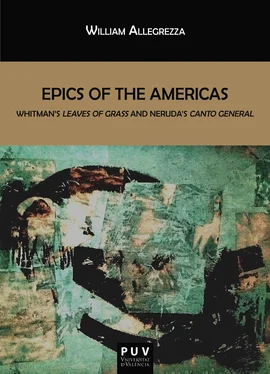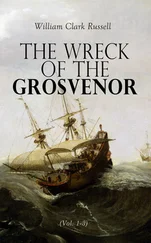William Allegrezza - Epics of the Americas
Здесь есть возможность читать онлайн «William Allegrezza - Epics of the Americas» — ознакомительный отрывок электронной книги совершенно бесплатно, а после прочтения отрывка купить полную версию. В некоторых случаях можно слушать аудио, скачать через торрент в формате fb2 и присутствует краткое содержание. Жанр: unrecognised, на английском языке. Описание произведения, (предисловие) а так же отзывы посетителей доступны на портале библиотеки ЛибКат.
- Название:Epics of the Americas
- Автор:
- Жанр:
- Год:неизвестен
- ISBN:нет данных
- Рейтинг книги:3 / 5. Голосов: 1
-
Избранное:Добавить в избранное
- Отзывы:
-
Ваша оценка:
- 60
- 1
- 2
- 3
- 4
- 5
Epics of the Americas: краткое содержание, описание и аннотация
Предлагаем к чтению аннотацию, описание, краткое содержание или предисловие (зависит от того, что написал сам автор книги «Epics of the Americas»). Если вы не нашли необходимую информацию о книге — напишите в комментариях, мы постараемся отыскать её.
Epics of the Americas — читать онлайн ознакомительный отрывок
Ниже представлен текст книги, разбитый по страницам. Система сохранения места последней прочитанной страницы, позволяет с удобством читать онлайн бесплатно книгу «Epics of the Americas», без необходимости каждый раз заново искать на чём Вы остановились. Поставьте закладку, и сможете в любой момент перейти на страницу, на которой закончили чтение.
Интервал:
Закладка:
Before discussing the works in detail, some explanation of why a Chilean poet, thousands of miles from the United States, chose a poet writing nearly a hundred years before him as a maestro and why comparing the two works sheds light on both is necessary.
Neruda’s Whitman
Many critics, such as Gordon Brotherson and Roberto González Echevarría, note a similarity between Whitman and Neruda, and James Nolan has written a book comparing them. Biographically, Walt Whitman’s effect on Latin America has been widely documented in studies by writers ranging from Fernando Alegría to Octavio Paz. In “The Accidental Tourist: Walt Whitman in Latin America,” Enrico Mario Santí documents Whitman’s effect on writers like Neruda, Paz, and Borges. Santí argues that Whitman is a cult figure in Latin America—this cult status descends from José Martí’s writings on Whitman after having seen him present one of his famous Lincoln lectures (159). The relation between Neruda and Whitman has also been widely discussed. 15
At the age of fifteen, Neruda first read Whitman’s works. At eighteen he wrote a review of a translation of Whitman’s poetry. Late in life Neruda discusses Whitman in an article entitled “Vengo a renegociar mi deuda con Walt Whitman” (“We live in a Whitmanesque Age”): 16
Por mi parte, yo, que tengo ahora cerca de 70 años, descubrí a Walt Whitman cuando tenía sólo 15, y lo consideré mi más grande acreedor. Estoy ante vostros, sintiendo que le guardo para simpre la m’as grande y maravillosa deuda que me ha ayudado a existir … Soy un poeta de habla hispana que Walt Whitman me ha enseñado más que el Cervantes … La queja del bardo sobre la poderosa influencia de Europa de la cual la literatura de su época continuó obteniendo su sustento. En verdad él, Walt Whitman, fue el protagonista de una verdader personalidad geográfica: el primber hombre de la historia en hablar con auténtica voz continental, en sustentar un auténtico nombre americano. (748)
As for myself, now a man of almost seventy, I was barely fifteen when I discovered Walt Whitman, my primary creditor. I stand here among you today still owing this marvelous debt that has helped me to live … I, a poet who writes in Spanish, learned more from Walt Whitman than from Cervantes … The bard complained of the all-powerful European influence that continued to dominate the literature of his time. In fact, it was he, Walt Whitman, in the persona of a specific geography, who for the first time in history brought honor to an American name. 17
This quotation shows Neruda’s close feelings for Whitman, but more than his close feelings, the quotation displays that Neruda thinks of Whitman as a poet of America. In his memoir he discusses Whitman as a “positive hero” (294), and he wrote many poems in which Whitman figures, including “Ode to Walt Whitman:”
Yo no recuerdo
a qué edad,
ni dónde,
si en el gran Sur mojado
o en la costa
temible, bajo el breve
grito de las gaviotas,
toqué una mano y era
la mano de Walt Whitman:
pisé la tierra
con los pies desnudos,
anduve sobre el pasto,
sobre el firme rocío
de Walt Whitman. (1-14)
I do not remember
at what age
nor where; in the great damp South
or on the fearsome
coast, beneath the brief
cry of the seagulls,
I touched a hand and it was
the hand of Walt Whitman.
I trod the ground
with bare feet,
I walked on the grass,
on the firm dew
of Walt Whitman.
A few lines later Neruda states, “tú / me enseñaste / a ser americano” (31-33) (“You / taught me / how to be an American”). In Canto general , Neruda calls on Whitman as he would a classical muse:
¡Dame tu voz y el peso de tu pecho enterrado
Walt Whitman, y las graves
raíces de tu rostro
para cantar estas reconstrucciones! (“Yo también más allá de tus tierras” 63-66)
Give me your voice and the weight of your buried breast
Walt Whitman, and the solemn
roots of your face
to sing these reconstructions! 18
At several moments in his life, Neruda translated poems from Leaves of Grass , and it is well-known that Neruda always kept at least one portrait of Whitman on his writing desk. In his memoir he tells a story of the picture. One day a gardener saw the picture and asked if the man was his grandfather. Neruda answered yes (Johnson’s “Neruda’s Impressions” 98). In many ways Whitman was Neruda’s poetic grandfather since Neruda picks up themes, styles, and structures from Whitman.
Besides Whitman’s poetry, the mythic image of Whitman, partially based on his life and partially based on Martí’s presentation of him, that pervaded Latin America influenced Neruda. For example, Whitman was from a working-class family and was active in politics. He worked as an editor for several newspapers, most with a democratic party slant. He was a delegate in Buffalo for the Free Soil Party, campaigned for Martin Van Buren, and worked for the Department of the Interior and the Attorney General’s office. Due to his own working-class background and political life, Neruda felt personal ties with Whitman, although Neruda was more influential as a politician. From his student days, he was active in leftist politics in Santiago. Later he held positions as consul in Ceylon, Java, Singapore, and Spain; moreover, he was the consul general of Mexico, the ambassador to France, a Chilean senator, and, for a brief period, a candidate for the Chilean presidency. He was an active member of the Communist Party of Chile, and this affiliation was the cause of his exile during the period that he was writing Canto general . Partially due to Whitman’s background, Neruda looked upon him as a poet of the people. Whatever it was that originally drew Neruda to Whitman’s work and persona, Neruda eventually came to see Whitman as the quintessential American poet and the poet from whom he could learn how to create an American epic work. When Neruda wrote Canto general , he, like poets in the United States, turned to Whitman as a predecessor. González Echevarría even suggests that Canto general , General Song , gains its title in opposition to Whitman’s Song of Myself — instead of writing about the individual, Neruda wanted to write a song for all (6). But more than volleying names, the two works are similar in purpose, style, content, and imagery. Neruda took up the mantle of the bardic American poet from Whitman, and in an attempt to write his own American epic, he patterns his work after Whitman’s Leaves of Grass .
Latin vs. Anglo: Diverging Myths
Besides having similar epic urges, several differences exist between the Latin American and the Anglo American literary traditions that require noting before we turn to Whitman’s and Neruda’s version of the lyric-epic. Many thinkers since colonization have put forward distinctions that they consider crucial for understanding the Americas; Román de la Campa summarizes what he views as the most influential: “civilization/barbarism, Anglo/Latin, North/South, capitalism/one-man rule … postmodernity/subalternity, civil society/chaos, global order/ungovernable cultures” (373). Many other divisions have been used to classify Anglo versus Latin America, such as First World/Third World, power/silence, and imperial power/subjects. Several differences between Latin and Anglo America that underscore the discussions in this study are historical. The most obvious historical distinction is discussed by Octavio Paz: “We are the children of the Counter Reformation and the Spanish Empire; they are children of Luther and the Industrial Revolution” (175). The protestant versus Catholic colonization of Latin and Anglo America has created several fundamental differences often noted. First, Latin America, as Richard Morse mentions, is more centralized than Anglo America (99). During the colonization, the Catholic church provided a center for the different colonies. The people were part of a community that had central leaders. The church provided higher educational facilities from an early period, with universities that focused on a type of Medieval scholasticism founded in developing cities. The different communities all had at the center the church to relate to, whereas in Anglo America, the Protestants focused on individuals communing with God. No central power existed to tie large communities together besides the colonial powers. The states formed as individual governing systems, so when freedom was gained in the U.S., it was accepted and expected due to colonial life. Contributing to the centralization of Latin America is also the colonization of native populations. In Latin America, especially in Central and Northern South America, Native American tribes were centralized. For example, the tribes surrounding the Aztecs were accustomed to paying tribute to the Aztecs because of their role as a central power. When the Spaniards took overtook the Aztecs, they grasped the central position of power. In large parts of South America, this overcoming of the central tribes amounted to a takeover of the native populations. 19 Native tribes were often incorporated into the new society even if in socially inferior positions. In contrast, in Anglo America, Native American tribes were not often centralized in large groups. Essentially, there were numerous tribes to fight once the present tribe was conquered. Thus, in North America the progress West involved continued fights, and there was less intermixing of natives and European descendants. On the one hand, the centralized power of Native Americans in Central and South America helped create a centralized society of Latin America, whereas the progress over individual tribes fostered a sense of protecting the individual in Anglo America. Additionally, when educational systems were developed in the United States, they were intended for the benefit of all, unlike in Latin America, where the educational systems were a mirror of the European systems, systems primarily intended for the wealthy or the religious. Octavio Paz believes that this difference creates a conception of reality as stable for Latin Americans and progressive for North Americans (175-176). Many critics, such as Valenzuela and Brotherson, agree with him. Valenzuela argues that time moves from the future to the present in North America and from the future to the past in Latin America (11-13).
Читать дальшеИнтервал:
Закладка:
Похожие книги на «Epics of the Americas»
Представляем Вашему вниманию похожие книги на «Epics of the Americas» списком для выбора. Мы отобрали схожую по названию и смыслу литературу в надежде предоставить читателям больше вариантов отыскать новые, интересные, ещё непрочитанные произведения.
Обсуждение, отзывы о книге «Epics of the Americas» и просто собственные мнения читателей. Оставьте ваши комментарии, напишите, что Вы думаете о произведении, его смысле или главных героях. Укажите что конкретно понравилось, а что нет, и почему Вы так считаете.












